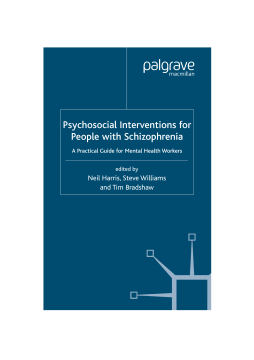
BOOK
Psychosocial Interventions for People with Schizophrenia
Neil Harris | Steve Williams | Tim Bradshaw
(2002)
Additional Information
Book Details
Abstract
Mental health care for people experiencing schizophrenia has changed dramatically over the last twenty years. This book draws on the expertise of a group of experienced clinical practitioners to provide an up-to-date understanding of this condition, and a practical guide to implementing evidence-based psychosocial interventions for people with schizophrenia. Written in a clear and accessible format, this book
-covers the historical, social and political perspectives which give meaning to the current position of mental health care
-includes up-to-date interventions framed within the context of peoples lives
-describes how these interventions translate into specialist areas of practice
Using a variety of clinical examples, this text provides a clear overview of schizophrenia, and serves as a comprehensive, practical guide to the understanding, treatment and management of this mental condition.
'It covers just about everything you might want to know about psychological interventions, from cognitive behavioral therapy to early warning signs to terapeutic employment, from the stress vulnerability model to the importance of clinical supervision...' - Tony Gillam, Mental Health Today
NEIL HARRIS has worked as a Clinical Nurse Specialist within Community Mental Health Teams, dedicated to people with serious mental illness since 1985.
STEVE WILLIAMS co-ordinates and leads the family intervention programme within the early psychosis service at Salford and Trafford.
TIM BRADSHAW currently works for COPE (Collaboration on Psychosocial Education) at the University of Manchester, where he is a programme director for the BSc (Hons) Psychosocial Interventions Course.
Table of Contents
| Section Title | Page | Action | Price |
|---|---|---|---|
| Cover | C | ||
| Contents | v | ||
| List of Tables | vii | ||
| List of Figures | vii | ||
| List of Boxes | viii | ||
| Notes on Contributors | ix | ||
| Foreword | xi | ||
| List of Abbreviations | xiii | ||
| Part I What is Schizophrenia? | 1 | ||
| 1 The Nature of Schizophrenia | 3 | ||
| 2 Hearing Voices Past and Present: A User’s Perspective | 18 | ||
| 3 Politics and Policies of Schizophrenia | 26 | ||
| Part II Clinical Skills | 37 | ||
| 4 The Helping Relationship | 39 | ||
| 5 Case Management | 53 | ||
| 6 Neuroleptic Drugs and Their Management | 68 | ||
| 7 Psychological Treatment for Anxiety and Depression in Schizophrenia | 84 | ||
| 8 Assessment and Therapeutic Interventions With Positive Psychotic Symptoms | 102 | ||
| 9 Identifying and Overcoming Negative Symptoms | 117 | ||
| 10 Relapse Prevention Intervention in Psychosis | 130 | ||
| 11 Working With Families | 143 | ||
| Part III Working and Living in the Community | 159 | ||
| 12 Working and Schizophrenia | 161 | ||
| 13 Neighbourhood Networking – Working With the Community as a Source of Support: A Practical Guide | 175 | ||
| Part IV Special Considerations | 187 | ||
| 14 Dual Diagnosis – Substance Misuse and Schizophrenia | 189 | ||
| 15 Risk and Serious Mental Health Problems | 205 | ||
| 16 Psychosocial Interventions in Institutional Settings | 221 | ||
| Part V Changing Service – Keeping Going | 235 | ||
| 17 Involving Service Users | 237 | ||
| 18 Training and Clinical Supervision | 251 | ||
| Conclusion | 267 | ||
| Index | 268 |
